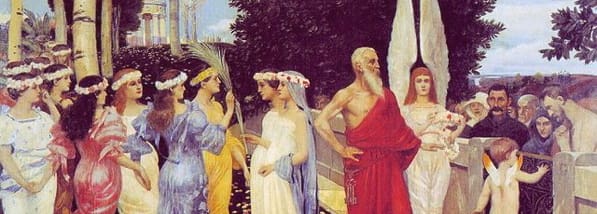ON HEAVEN
“Your sorrow shall be turned into joy.”
John 16:20
Let us at present animate ourselves with the hope of heaven, to bear patiently the afflictions of this life, and to offer them to God in return for the sufferings which Jesus Christ endured for the love of us. All these afflictions, sorrows, persecutions, and fears, shall one day have an end, and shall, if we save our souls, become to us sources of joy and happiness in the kingdom of bliss. This is the ground of courage and hope which the Savior holds out to us. “Your sorrow shall be turned into joy” (John 16:20). Let us, then, this day make some reflections on the joys of heaven. But what shall we be able to say on these joys, when the most enlightened of the saints knew not how to give us an idea of that happiness which God has prepared for his faithful servants? David could only say that paradise is a good exceedingly to be desired. “How lovely are thy tabernacles, O Lord of hosts!” (Psalm 84:2). But, my beloved St. Paul, do you, at least, who had the happiness of being rapt up into heaven, declare to us some of the things you have seen. “No,” exclaims the apostle, “what I have seen it is impossible to describe. The delights of heaven are secret words which it is not granted to man to utter” (cf 2 Corinthians 12:4). They are so great that they only who enjoy them are able to comprehend them. “All that I can say of them,” says the apostle, “is that ‘eye hath not seen, nor ear heard, neither hath it entered into the heart of man, what things God hath prepared for them that love him'” (1 Corinthians 2:9). No man living has ever seen, or heard, or conceived, the beauty, the harmony, the delights, which God has prepared for those who love him.
At present, it is impossible for us to comprehend the happiness of heaven, because we have no idea but of earthly enjoyments. Were a horse capable of reasoning, he would, if he expected a rich feast from his master, imagine it to consist in excellent hay and oats; for these are the only species of food of which he has any idea. It is thus we form our notions of the happiness of heaven. It is beautiful in the summer to behold at night the starry heaven; it is delightful in the spring to stand on the shore when the sea is unruffled, and to see in its bosom the rocks covered with seaweed, and the fishes gliding through the waters; it is also delightful to be in a garden full of fruits and flowers, ornamented with flowing fountains, and enlivened by the flutter and singing of birds: in such a scene one is tempted to exclaim, “O, what a paradise! What a paradise! But far different are the delights of heaven. To form some imperfect idea of them, let us reflect that in heaven is an all-powerful God, who has pledged himself to make the soul that loves him happy. Do you wish, say St. Bernard, to know what is in heaven? “Nihil est quod nolis, totum est quod velis.” There is nothing there that gives displeasure; there is everything that delights.
 O God! What shall be the sentiments of the soul on its entrance into that happy kingdom? Let us represent to our minds the death of a young man, who, after consecrating himself to the love of Jesus Christ, dies and quits this world. The soul is presented for judgment; the Judge embraces her, and pronounces the sentence of her salvation. Her angel-guardian meets and congratulates with her; she thanks him for his assistance, and the angel then says to her, “Rejoice, O happy soul; thy salvation is now secure; come and behold the face of thy Lord.” Behold, the soul now passes beyond the clouds, the spheres, the stars, and enters into heaven. O God! What shall be her feelings on first getting her foot in this happy country, and beholding for the first time, this city of delights! The angels and the saints shall come to meet her, and shall receive her with a joyous welcome. What shall be her consolation in rejoining there her relatives or friends, who have been already admitted into heaven, and in meeting her holy advocates! The soul shall wish to bend her knees to venerate these saints; but they shall say, “See thou do it not for I am thy fellow-servant” (Revelation 22:9). She shall thence be carried to kiss the feet of Mary, the queen of heaven. What tenderness shall not the soul experience in first beholding this divine mother, who gave her so much assistance in the work of her salvation! For then the soul shall see all the graces she obtained through the intercession of Mary, who will embrace her with love and tenderness. This queen of heaven shall then conduct the soul to Jesus, who will receive her as his spouse, and will say, “Come from Lebanon, my spouse…thou shall be crowned” (cf Song of Songs 4:8 and following). My spouse, rejoice; there is now an end to tears, to sufferings, and to fears; receive the eternal crown I have purchased for you by my blood. Jesus himself shall then present her to receive the benediction of his divine Father, who shall embrace and bless her, saying, “Enter thou into the joy of thy Lord” (cf Matthew 25:21), and shall bestow upon her the same happiness which he himself enjoys.
O God! What shall be the sentiments of the soul on its entrance into that happy kingdom? Let us represent to our minds the death of a young man, who, after consecrating himself to the love of Jesus Christ, dies and quits this world. The soul is presented for judgment; the Judge embraces her, and pronounces the sentence of her salvation. Her angel-guardian meets and congratulates with her; she thanks him for his assistance, and the angel then says to her, “Rejoice, O happy soul; thy salvation is now secure; come and behold the face of thy Lord.” Behold, the soul now passes beyond the clouds, the spheres, the stars, and enters into heaven. O God! What shall be her feelings on first getting her foot in this happy country, and beholding for the first time, this city of delights! The angels and the saints shall come to meet her, and shall receive her with a joyous welcome. What shall be her consolation in rejoining there her relatives or friends, who have been already admitted into heaven, and in meeting her holy advocates! The soul shall wish to bend her knees to venerate these saints; but they shall say, “See thou do it not for I am thy fellow-servant” (Revelation 22:9). She shall thence be carried to kiss the feet of Mary, the queen of heaven. What tenderness shall not the soul experience in first beholding this divine mother, who gave her so much assistance in the work of her salvation! For then the soul shall see all the graces she obtained through the intercession of Mary, who will embrace her with love and tenderness. This queen of heaven shall then conduct the soul to Jesus, who will receive her as his spouse, and will say, “Come from Lebanon, my spouse…thou shall be crowned” (cf Song of Songs 4:8 and following). My spouse, rejoice; there is now an end to tears, to sufferings, and to fears; receive the eternal crown I have purchased for you by my blood. Jesus himself shall then present her to receive the benediction of his divine Father, who shall embrace and bless her, saying, “Enter thou into the joy of thy Lord” (cf Matthew 25:21), and shall bestow upon her the same happiness which he himself enjoys.
Affections and Prayers
Behold, O my God, at thy feet an ungrateful sinner, whom thou hast created for heaven, but who has so often, for the sake of a wretched pleasure, renounced thee to thy face, and has consented to be condemned to hell. But I hope thou hast already pardoned me all the injuries I have done thee, for which I am always sorry, and will be sorry as long as I live. Of these injuries I desire to receive from thee new pardon. But, O God! Although my sins have been already forgiven, it will still be always true that I have dared to afflict thee, my Redeemer, who hast given thy life to bring me to thy kingdom. But may thy mercy be forever praised and blessed, O my Jesus, for having borne with me with so much patience, and for having bestowed upon me multiplied graces, instead of chastising me, as I deserved. I see, my dear Savior, that thou dost ardently desire my salvation, and that thou wishest to bring me to thy kingdom, that I may love thee forever; but it is thy wish that I should first love thee here on earth. Yes; I wish to love thee. Though there were no heaven, I would wish to love thee, while I live, with my whole soul and with all my strength. It is enough for me to know that thou, my God, desirest to be loved by me. My Jesus, assist me by thy grace; do not abandon me. My soul is immortal; I must then either love thee or hate thee for all eternity. Ah! It is my wish to love thee for eternity, and I wish to love thee without reserve here, that I may love thee without reserve hereafter. Dispose of me as thou pleasest; chastise me as thou wishest; do not deprive me of thy love, and then do with me what thou wishest. My Jesus, thy merits are my hope. O Mary, I place great confidence in thy intercession. Thou didst deliver me from hell when I was in sin; now that I wish to give myself to God, obtain for me the grace to save my soul, and to become a saint.
Editor’s Note: This meditation is from St. Alphonsus Liguori’s “Preparation for Death” (1758).
Art: An der Himmelspforte (At Heaven’s Gate), Hans Sandreuter, 1894, PD-US, copyright expired, Wikimedia Commons.




